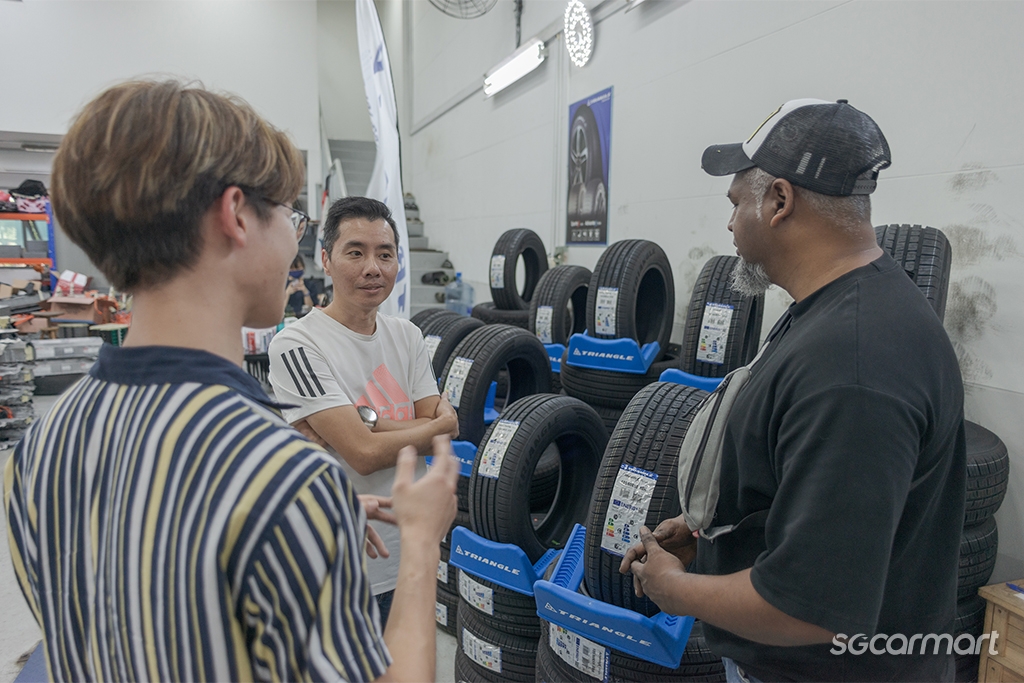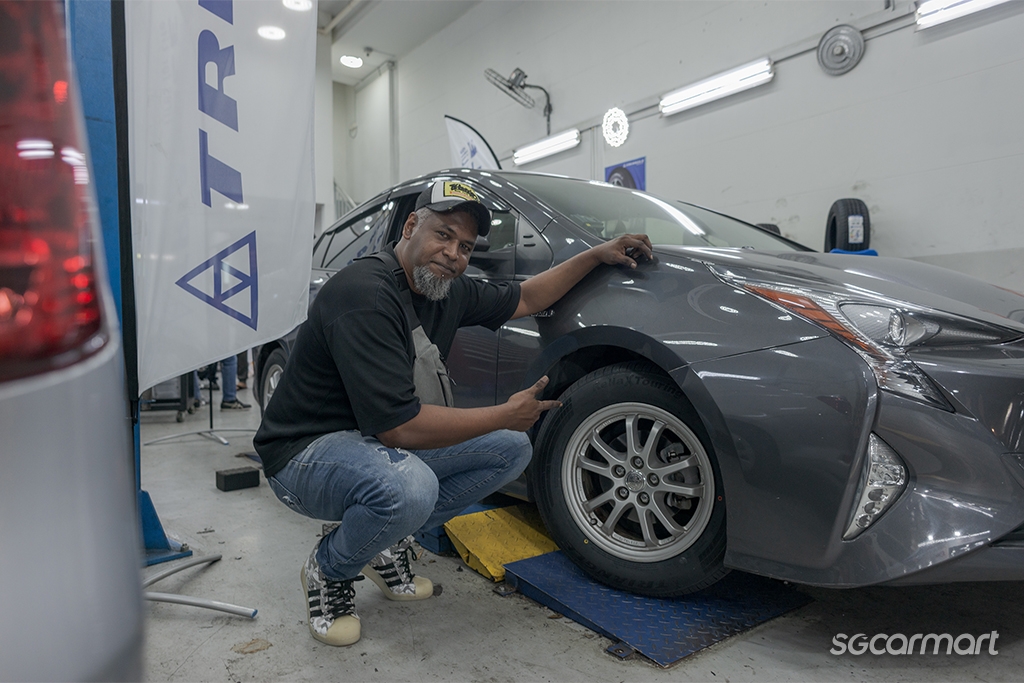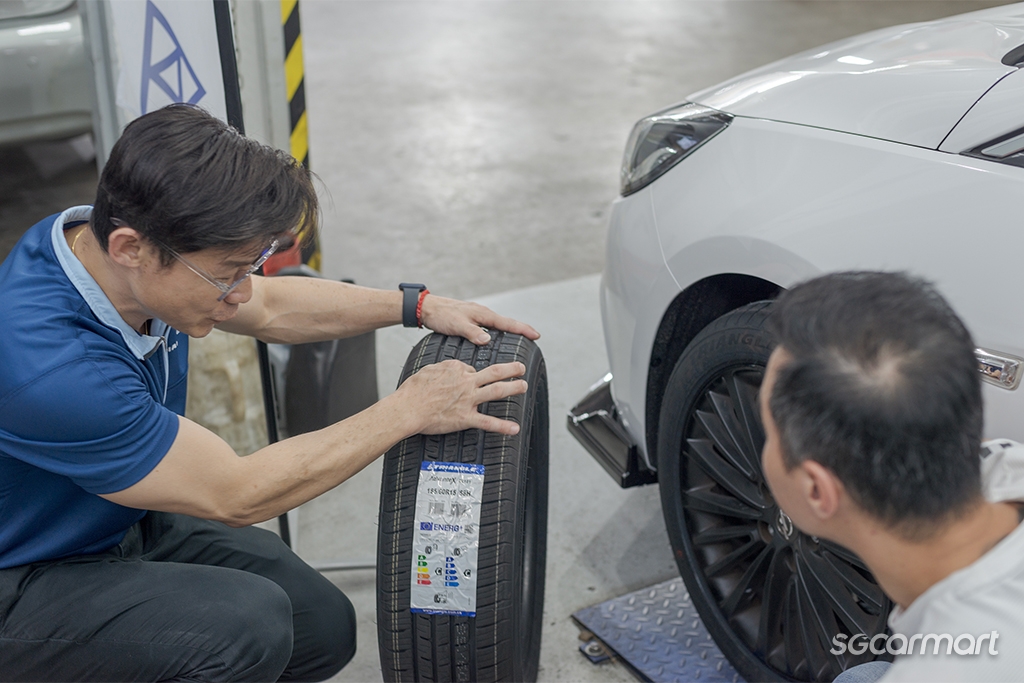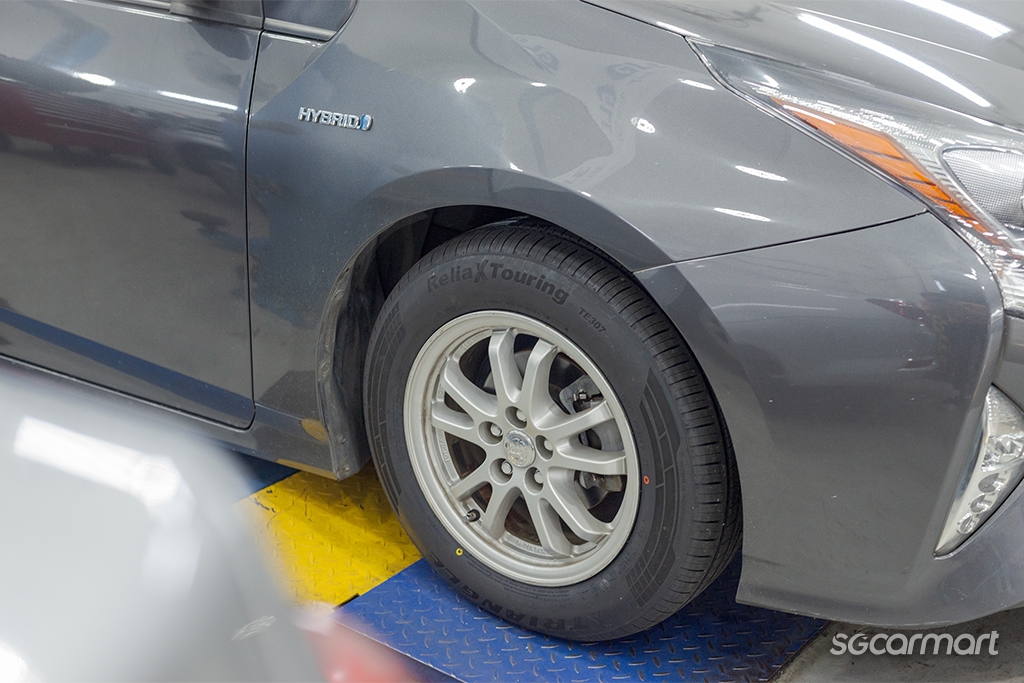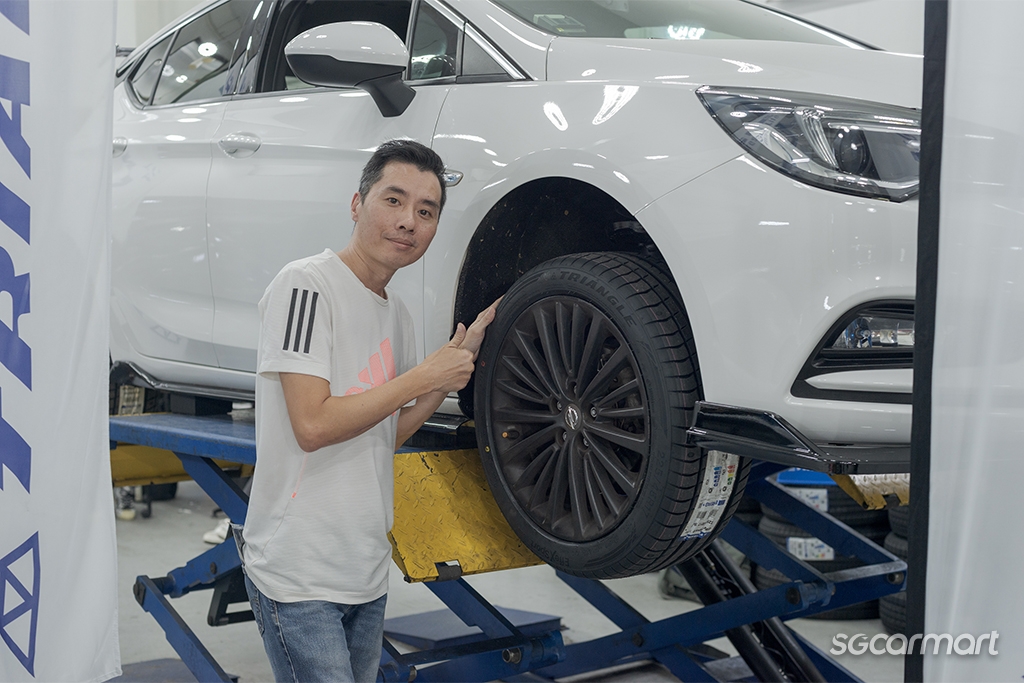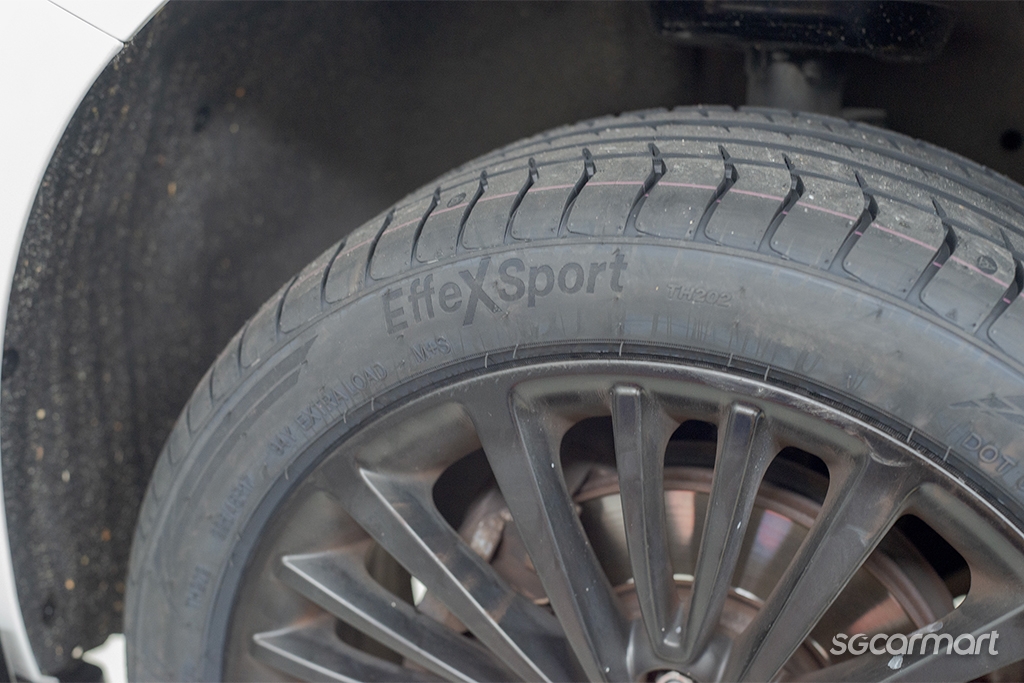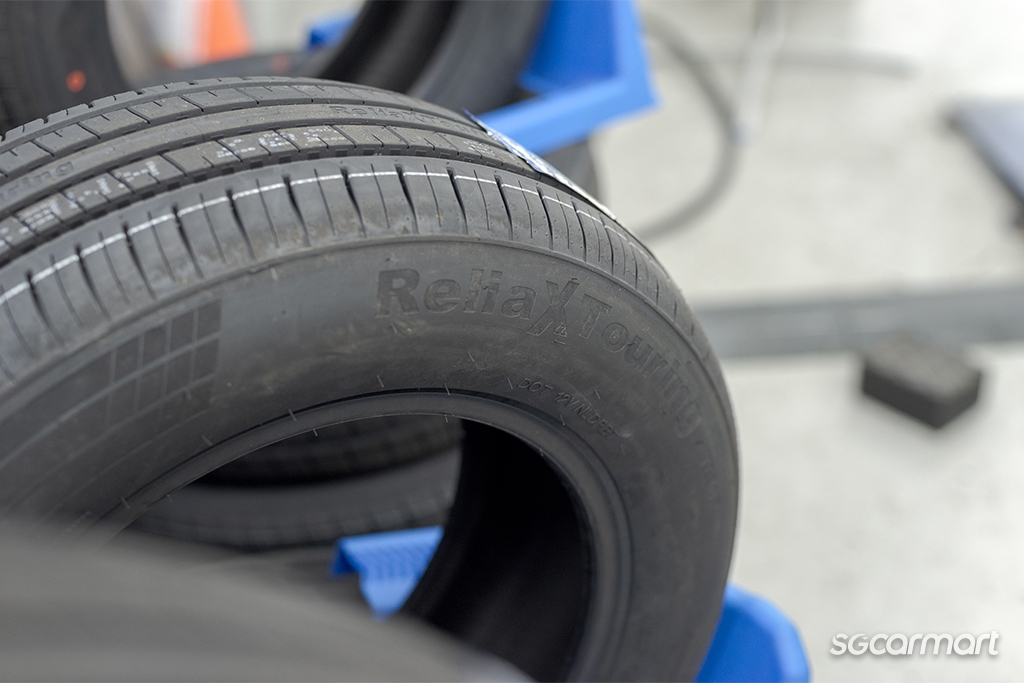Rubber meets the road: A day in the life of a PHV driver
12 Aug 2023|4,279 views
Mandarin is not one of his native tongues. But with the sheer volume of passengers he comes into contact with - a result too of the sheer amount of time he spends on the road daily - Justin Kumar has already picked up bits of the language.
"I can understand a fair bit, and I can speak some back, and then it'll be a more interesting conversation", he relates to us with a wide grin. "It makes your journey more fun - not so boring."
Jeffrey Soh sees the job quite differently. "For me, I just keep my mouth shut", he says with a small laugh. "Most of the passengers also talk a lot. But I just listen. I'm more of the silent type."
Both Jeffrey and Justin, of course, are private-hire vehicle (PHV) drivers - the former having been in the industry for about eight years now, and the latter, for around five.
Both of their days start at around 7:00am, and unsurprisingly, are laser-focused on one thing when they take to our city's roads every morning: Hitting "the target". Whereas Jeffrey is normally able to call it a day by 5:00pm, however, Justin sometimes only heads home around 8:00pm.
Even with breaks factored in, that effectively means 12-hour daily shifts, during which easily 100km of driving can be clocked in each stint. This amounts to about "600 to 700km a week - plus or minus," and when you extrapolate the figure over an entire year, arrive at a total of around 35,000 to 36,000km in annual mileage. The average Singaporean driver does 17,000km.
That presents to the PHV-driver a unique set of circumstances. Regular vehicle maintenance is crucial to the job, and tyres take up a fairly significant proportion of expenses incurred. Every dollar already counts, but a PHV-driver's tyres need to be switched out at a significantly quicker rate than the average driver's.
"It's constant driving. Compared to normal drivers where they're just going from Point A to Point B, it's many trips in our case - up and down, up and down, many times," Justin explains.
On the other hand, however, the quality of the physical product itself is also crucial.
It's not just for acoustic comfort or performance too, although these are important if half your waking time is spent driving. Above that, imagine every single hour you've been on the road as a driver yourself in bad weather, and multiply that tenfold; safety - and a sense of assurance - are both also part of the equation for PHV-drivers.
On this note Justin, who drives the outgoing Toyota Prius, says he eventually settled with the Triangle-manufactured tyres on his car for their mix of economy, and ability to give him good grip and fuel efficiency. ("Certain tyres 'eat' petrol; this really doesn't.")
"There are definitely more 'premium' tyres in the traditional sense, but it doesn't make more sense for us as PHV-drivers," he explains. "We want a tyre that is economical, that's good for wet and dry roads - has good grip - and is easier on our pockets."
Officially introduced to the market at Triangle Tyre's Asia Pacific Dealer Conference back in March this year, the ReliaX Touring TE307 tyres his Prius uses are designed for durability and high mileage-use, while also providing excellent fuel economy and enhancing acoustic comfort.
While the latter quality has been made possible due to its closed shoulder and variable-pitch thread design, Triangle says a new generation compound with functionalised high polymer and high silica reinforcing eco-materials was used in the tyre. While improving durability, this is also said to help reduce rolling resistance.
Furthermore, unique asymmetric longitudinal groove angles combined with a steel blade design help to improve grip and wet handling performance.
As Jeffrey shows, however, it's not just blunt fuel economy that sits atop every PHV-driver's mind: Balancing that quality out with ride comfort and driving pleasure is also important.
His 1.0-litre Opel Astra was a purchase that was made from a personal inclination towards 'continental cars' ("The feel is different," he explains, and the Astra's depreciation was on par with other mass market Japanese models).
Noting general ride comfort, cabin insulation, and driving engagement as the car's key qualities, his Astra instead relies on Triangle's high-performance EffeX Sport tyres.
A key quality of the EffeX Sport TH202 tyre is its high rigidity block design at the outer shoulder. This helps to deliver better handling and braking performance.
Worth noting too is the fact that Triangle has designated this as its "ultra high-performance" (UHP) tyre, which uses a new compound technology for its rubber that helps reduce rolling resistance, while also improving grip on both wet and dry roads.
Finally, the TH202 tyre also relies on what Triangle calls a 'longitudinal groove mute technology', which has a noise dampening effect. An Opel Astra is certainly not an EV – at least not the current one, nor the one driven by Jeffrey - but Triangle says the tyre is suited for EV use too.
Through it all, however, Jeffrey's priority remains the same as Justin's. "We don't need to buy premium branded tyres, honestly," he points out. "Price-competitiveness, value-for-money and the assurance of safety are all priorities, and for us, as long as [the product] delivers on the road, that's enough."
Triangle Tyre, as many know, is proud of the fact that its headquarters are located in Weihai, Shandong. But both drivers are also unfazed about pre-existing prejudices still held against Chinese brands in terms of quality.
In fact, Jeffrey goes on to share that he first made the switch to Triangle as the brand was recommended to him by a group of PHV-friends. "That they are all-rounders," is the response when we ask what exactly was conveyed to him (and thus what piqued his curiosity) about the tyres.
Justin concurs. "No doubt, it's from China," he admits. "But everything you buy, you wear, it's all manufactured in China anyway. At least 90% of the stuff most of us touch are all made from China. People are still buying these products."
Ultimately, both believe in letting the products speak for themselves - and personally attest to the tyres delivering what their specifications state
"You have to try it to know it," Justin points out. "Many have tried it (the tyres), and the feedback was good. We've tried it too ourselves - and we can also testify that it’s also good."
As part of Singapore's National Day celebrations in August, the first 100 customers who purchase Triangle tyres will be entitled to $20 off their total bill (minimum purchase of 4 tyres). Promotion is valid for 30 days, starting from date of this article. For more details, head on down to Triangle’s Facebook page to better understand how the promotion works.
Triangle Tyre would also like to thank Trident Auto Service Centre for its continued partnership and support.
Mandarin is not one of his native tongues. But with the sheer volume of passengers he comes into contact with - a result too of the sheer amount of time he spends on the road daily - Justin Kumar has already picked up bits of the language.
"I can understand a fair bit, and I can speak some back, and then it'll be a more interesting conversation", he relates to us with a wide grin. "It makes your journey more fun - not so boring."
Jeffrey Soh sees the job quite differently. "For me, I just keep my mouth shut", he says with a small laugh. "Most of the passengers also talk a lot. But I just listen. I'm more of the silent type."
Both Jeffrey and Justin, of course, are private-hire vehicle (PHV) drivers - the former having been in the industry for about eight years now, and the latter, for around five.
Both of their days start at around 7:00am, and unsurprisingly, are laser-focused on one thing when they take to our city's roads every morning: Hitting "the target". Whereas Jeffrey is normally able to call it a day by 5:00pm, however, Justin sometimes only heads home around 8:00pm.
Even with breaks factored in, that effectively means 12-hour daily shifts, during which easily 100km of driving can be clocked in each stint. This amounts to about "600 to 700km a week - plus or minus," and when you extrapolate the figure over an entire year, arrive at a total of around 35,000 to 36,000km in annual mileage. The average Singaporean driver does 17,000km.
That presents to the PHV-driver a unique set of circumstances. Regular vehicle maintenance is crucial to the job, and tyres take up a fairly significant proportion of expenses incurred. Every dollar already counts, but a PHV-driver's tyres need to be switched out at a significantly quicker rate than the average driver's.
"It's constant driving. Compared to normal drivers where they're just going from Point A to Point B, it's many trips in our case - up and down, up and down, many times," Justin explains.
On the other hand, however, the quality of the physical product itself is also crucial.
It's not just for acoustic comfort or performance too, although these are important if half your waking time is spent driving. Above that, imagine every single hour you've been on the road as a driver yourself in bad weather, and multiply that tenfold; safety - and a sense of assurance - are both also part of the equation for PHV-drivers.
On this note Justin, who drives the outgoing Toyota Prius, says he eventually settled with the Triangle-manufactured tyres on his car for their mix of economy, and ability to give him good grip and fuel efficiency. ("Certain tyres 'eat' petrol; this really doesn't.")
"There are definitely more 'premium' tyres in the traditional sense, but it doesn't make more sense for us as PHV-drivers," he explains. "We want a tyre that is economical, that's good for wet and dry roads - has good grip - and is easier on our pockets."
Officially introduced to the market at Triangle Tyre's Asia Pacific Dealer Conference back in March this year, the ReliaX Touring TE307 tyres his Prius uses are designed for durability and high mileage-use, while also providing excellent fuel economy and enhancing acoustic comfort.
While the latter quality has been made possible due to its closed shoulder and variable-pitch thread design, Triangle says a new generation compound with functionalised high polymer and high silica reinforcing eco-materials was used in the tyre. While improving durability, this is also said to help reduce rolling resistance.
Furthermore, unique asymmetric longitudinal groove angles combined with a steel blade design help to improve grip and wet handling performance.
As Jeffrey shows, however, it's not just blunt fuel economy that sits atop every PHV-driver's mind: Balancing that quality out with ride comfort and driving pleasure is also important.
His 1.0-litre Opel Astra was a purchase that was made from a personal inclination towards 'continental cars' ("The feel is different," he explains, and the Astra's depreciation was on par with other mass market Japanese models).
Noting general ride comfort, cabin insulation, and driving engagement as the car's key qualities, his Astra instead relies on Triangle's high-performance EffeX Sport tyres.
A key quality of the EffeX Sport TH202 tyre is its high rigidity block design at the outer shoulder. This helps to deliver better handling and braking performance.
Worth noting too is the fact that Triangle has designated this as its "ultra high-performance" (UHP) tyre, which uses a new compound technology for its rubber that helps reduce rolling resistance, while also improving grip on both wet and dry roads.
Finally, the TH202 tyre also relies on what Triangle calls a 'longitudinal groove mute technology', which has a noise dampening effect. An Opel Astra is certainly not an EV – at least not the current one, nor the one driven by Jeffrey - but Triangle says the tyre is suited for EV use too.
Through it all, however, Jeffrey's priority remains the same as Justin's. "We don't need to buy premium branded tyres, honestly," he points out. "Price-competitiveness, value-for-money and the assurance of safety are all priorities, and for us, as long as [the product] delivers on the road, that's enough."
Triangle Tyre, as many know, is proud of the fact that its headquarters are located in Weihai, Shandong. But both drivers are also unfazed about pre-existing prejudices still held against Chinese brands in terms of quality.
In fact, Jeffrey goes on to share that he first made the switch to Triangle as the brand was recommended to him by a group of PHV-friends. "That they are all-rounders," is the response when we ask what exactly was conveyed to him (and thus what piqued his curiosity) about the tyres.
Justin concurs. "No doubt, it's from China," he admits. "But everything you buy, you wear, it's all manufactured in China anyway. At least 90% of the stuff most of us touch are all made from China. People are still buying these products."
Ultimately, both believe in letting the products speak for themselves - and personally attest to the tyres delivering what their specifications state
"You have to try it to know it," Justin points out. "Many have tried it (the tyres), and the feedback was good. We've tried it too ourselves - and we can also testify that it’s also good."
As part of Singapore's National Day celebrations in August, the first 100 customers who purchase Triangle tyres will be entitled to $20 off their total bill (minimum purchase of 4 tyres). Promotion is valid for 30 days, starting from date of this article. For more details, head on down to Triangle’s Facebook page to better understand how the promotion works.
Triangle Tyre would also like to thank Trident Auto Service Centre for its continued partnership and support.
Thank You For Your Subscription.









